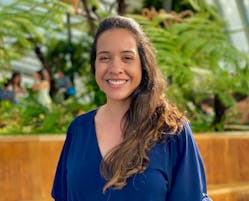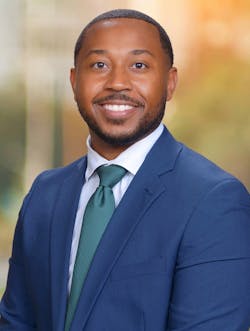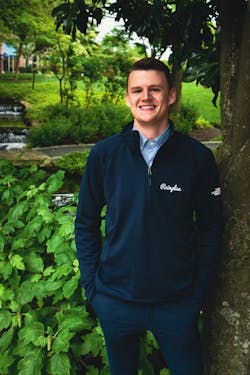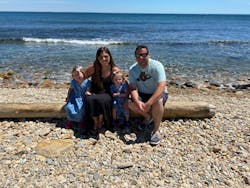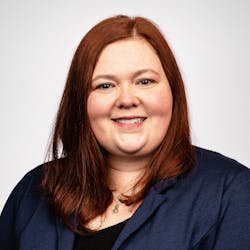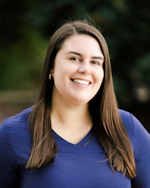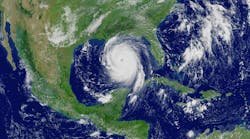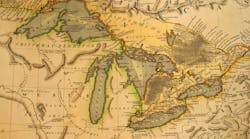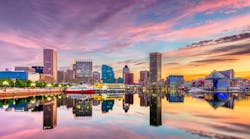Each year, Stormwater Solutions highlights a class of motivated and eager Young Professionals who are helping move the industry forward. 2023 is no exception. On the following pages, read about this year’s five Young Pros. Whether they are professors, engineers or public works superintendents, this group of professionals show the range needed to build the industry up. In addition to these questionnaires, each Young Pro will be featured in a video interview on our website, stormwater.com.
Company Name: University of Maryland
Age: 30
What are your professional certifications and education? PhD in Water Engineering – University of Exeter (UK); MSc in Civil and Environmental Engineering – Federal University of Campina Grande (Brazil); BS – Civil Engineering - Federal University of Campina Grande (Brazil)
What are your professional accomplishments? I do not think we will ever stop having small accomplishments. Earning my PhD in the field that I love was meaningful for me. The journey for anyone that wants a specialization in a field is long, so it was very rewarding to get it. At the same time, I also feel very happy for being able to do my job in the field that I love mentoring and supporting students and being able to do participatory approaches with communities.
How did you come to be in the water industry? I always felt connected with water. My hometown in Brazil (Campina Grande) is a city that faces water shortage but also floods. I remember a few episodes with flooding in the city, but I never really thought about working with flood reduction. When I started my bachelor's in civil engineering back in 2010, I started to feel more connected with water resources in general, and after a long journey, now I work with stormwater mitigation, social vulnerability and flood reduction solutions.
What are your goals? My main goal in my research/work is to be able to provide real life solutions for communities dealing with flooding. When we face floods, it is key to hear what people have to say about the disasters – their views, perceptions, awareness. In this sense, my main goal is to be able to link environmental and social perspectives when looking to mitigate floods impacts, especially in more vulnerable communities.
Who is your greatest influence? My parents always supported me while I was studying. They were the support I needed to get through the process. Years ago, this role was also shared by my husband, who also supports me to continue on this path.
What are your hobbies outside of work? I really love to be in contact with nature. So, long-walk breaks in natural pathways together with a cup of coffee are at the top of my list.
What is a fun/surprising fact about you? People often say that my laugh is “real” - which could mean it is loud.
What piece of media (books, TV shows, movies, games, podcasts, etc.) has had the greatest impact on you in the past 12 months?
I love to read! In the last few months, I have been reading a lot about joy, hope and the circumstances of life.
Are you involved in the community outside of work? If so, how? Yes, I love to do volunteer work in the community! I love to work with children in the church and spend some time speaking with them!
What is your hidden talent? I love to communicate and to be a good ear to people!
What is your biggest lesson learned so far? My biggest lesson is that I am much more when I have others working with me.
What do you think is the most pressing issue facing the stormwater industry and how we can we work to overcome it? In this field, it is easy to focus more on technical aspects rather than on the social aspects of people facing water-related disasters. One of the challenges is to find appropriate ways to communicate with those vulnerable communities but also how to translate our work and expertise for them. It is also hard to include their opinion in our own work. But I believe that with these smaller steps, our results and findings would be much more applicable in real life.
Official Title: Associate Professor of Urban Studies and Planning and Director of the Stormwater Infrastructure Resilience and Justice (SIRJ) Lab
Company Name: University of Maryland, College Park
Age: 35
What are your professional certifications and education? Ph.D., Urban and Regional Science, Department of Landscape Architecture and Urban Planning, Texas A&M University, M.P.H., Public Health, Social and Behavioral Health, School of Public Health, Texas A&M University; B.A., Psychology with Health Promotion Minor, University of North Texas
What are your professional accomplishments? I am a recently tenured associate professor of Urban Studies and Planning at the University of Maryland. My research has been published in several journals including the Journal of the American Planning Association, Journal of Planning Education and Research and more. While at UMD, I received two awards from the Gulf Research Program of the National Academies of Science, Engineering, and Medicine and The JPB Environmental Health Fellows Program at Harvard T. H. Chan School of Public Health. I was also selected as one of 50 emerging leaders or “Fixers” in the 2021 Grist 50, have served on the U.S. Environmental Protection Agency’s (EPA) Science Advisory Board (SAB), and was an author on the U.S. Fifth National Climate Assessment. I am a founding fellow of the William Averette Anderson Fund (BAF). Currently, I am serving as Senior Advisor for Climate and Community Resilience on the White House Council on Environmental Quality's Environmental Justice team.
How did you come to be in the water industry? I came to be in the water industry by way of natural hazard scholarship, water and wet-weather related hazards specifically. As a doctoral student, I worked as a research assistant for the Hazard Reduction and Recovery Center at Texas A&M University and was trained by scholars who studied the physical and social risks, exposure, impacts and opportunities for mitigation associated with urban flooding. I was particularly interested in matters of both extreme events and disasters as well as the everyday circumstances related to stormwater planning and management, including infrastructure, that fundamentally set the stage for flooding.
What are your goals? My goal is to take a social lens to what has largely been studied as a physical problem in terms of water risks towards water and infrastructural justice. My ongoing research efforts include my Stormwater Infrastructure Resilience and Justice (SIRJ) Lab at “Maryland’s Built Environment School”, the School of Architecture, Planning, and Preservation at the University of Maryland that I established in 2019. We’re interested in how stormwater runoff can overwhelm stormwater infrastructure. Lower income communities, particularly of color, are expected to face worse stormwater problems. These realities could have some notable consequences for communities of color in light of everyday differential urban stormwater management, flood exposures, disaster damage outcomes, economic impacts, and resilience. We use a combined social vulnerability to disaster and environmental justice framework to understand how social processes and development patterns create hazardous human-built environments and vulnerable infrastructure and the related risks in urban stormwater management and flooding. We also create opportunities for participatory action that advance the sustainable design, planning, and development decision making of communities to mitigate risks, achieve healthier, more equitable places and resilient natural, built, and social environments.
Who is your greatest influence? Personally, my biggest influence is my late stepfather David Williams, Sr. He was an amazing person who represented the best of humanity in his humility, generosity, curiosity, faith, and service. I wouldn't be the principled and pioneering person that I am without him in my life. Professionally, my greatest influence is sociologist W.E.B. DuBois because not only did he represent possibility in science for thousands of scholars of color to follow him, but he was also one of the first scholars to systematically study the lived experiences of groups of people who live at the social, political, physical, and environmental margins of society, particularly Black communities, and mapped, demonstrated, and documented the impacts to health, wealth, housing, and overall quality of life that was foundational to the modern day environmental justice scholarship and the movement by the same name. Other influences include my other parents, siblings, friends, and mentors.
What are your hobbies outside of work? My hobbies outside of work include running, biking, hiking, and other outdoor activities as well as enjoying live music and visual art.
What is a fun/surprising fact about you? I won an oratorical contest in grade school, approximately the 2nd grade, and my speech was about whales.
What piece of media (books, TV shows, movies, games, podcasts, etc.) has had the greatest impact on you in the past 12 months?Mr. Morale and the Big Steppers, the fifth studio album by American rapper Kendrick Lamar is the medium that has had the biggest impact on me in the past 12 months because it is a highly introspective piece of art that poetically deals in the generational trauma of Black and impoverished folks in this country from childhood through COVID-19.
Are you involved in the community outside of work? If so, how? Not really because there's a natural and passionate continuum between my professional work and personal mission that's rooted in lived experiences. My work is not simply a career for me, but a service opportunity to rewrite the narrative and reset the stage for communities who have "lived with water" for better or for worse since the inception of this country and exiled to spaces deemed as undesirable due to the wet and flood-prone conditions. I understand that true progress and change takes a lifetime and is transgenerational. I have been the beneficiary of mentoring from skilled scholars and activists and thus am witness to the importance of legacy and succession, especially for people of color and I'm committed to lifting those up behind me at the workplace and beyond.
What is your hidden talent? My hidden talent is art and chess, both of which I've competed in and/or showcased as an amateur. Past artwork includes drawing, painting, press, and sculpture and has been exhibited in gallery shows in my hometown of Dallas.
What is your biggest lesson learned so far? In life and work, to trust the process. In work and water, listen to the people that occupy the places.
What do you think is the most pressing issue facing the stormwater industry and how can we work to overcome it? The most pressing issue(s) is the disconnect between the social and the physical in stormwater planning, the polarization of green versus gray infrastructure as opposed to some hybridized middle ground, spending on and thinking about short term initial construction versus longer-term ongoing maintenance, and representation in the profession, to name a few. The solution is diversity, which is usually always a good thing.
Official Title: Rainplanner
Company Name: Rainplan
Age: 26
What are your professional certifications and education? I have a Bachelor's in Science in Urban Planning with a minor in Public Administration and Political Science.
What are your professional accomplishments? State Employees Credit Union Public Service Fellow 2018 – (IDOT) Statewide Planning and Research Funds (SPR) federal grant: project manager for the application, which led to our firm successfully securing $300,000 in funding to complete a corridor study. Previous employer – Winnebago County Multi-Hazard Mitigation Plan: project manager for the update of a federally required document. Now working with a green infrastructure tech startup (Rainplan) focused on facilitating successful green infrastructure and stormwater investments for residential and commercial clients.
How did you come to be in the water industry? My background is in land use and environmental planning. I was recruited in late 2021 by Rainplan. I just kind of fell into the opportunity, and I was excited by what Rainplan was doing. I would credit both of Rainplan's founders, Greg and Rob, for emboldening me with their vision and continuing to push me towards bettering myself as well as challenging myself in this industry.
What are your goals? Currently, I see myself working towards a more senior role in client relationship management specifically with respect to Rainplan's commercial clients. As we continue to diversify and better define our service offerings - I am excited to see how I grow at this company. My long-term professional goal is to land a V-level role with respect to administration and relationship management.
Who is your greatest influence? My papa, Charles
What are your hobbies outside of work? Kickball w/ D.C. Fray, hunting for the best espresso martini in Washington, D.C., and finding any and every excuse I can to play with my friend's dogs.
What is a fun/surprising fact about you? I am a surprisingly great cook for someone who, most of the time, uses a recipe randomizer.
What piece of media (books, TV shows, movies, games, podcasts, etc.) has had the greatest impact on you in the past 12 months? Dune – I saw it in theatres twice and have watched it on HBO twice. Dennis Villanueve is a great director.
Are you involved in the community outside of work? If so, how? I am informally involved/want to shoutout the Guide Dog Foundation and American Vet Dog Foundation. They do amazing work and have some of the cutest dogs on the planet.
What is your hidden talent? I am very good at hanging mirrors (per my friend)
What is your biggest lesson learned so far? Being kind to yourself is critical to being happy with yourself.
What do you think is the most pressing issue facing the stormwater industry and how can we work to overcome it? Car-dependency. Parking lots represent something like 5% of all urban land in the lower-48 states. Converting all that land to more pervious materials or removing it all together to mitigate urban floodings/stormwater is a critical component of lessening the United States' negative environmental impact at the global level. Working to overcome this will involve a national campaign of education, incentives, investment and cultural changes.
Official title: Superintendent of Public Works
Company name: Village of Westhampton Beach
Age: 36
What are your professional certifications and education? 1. Homeland Security from the U.S. Emergency Management Institute; 2. NYS Asbestos Supervisors License; 3. Six Sigma
What are your professional accomplishments? Project Manager for more than $30 million dollars in public infrastructure upgrades within the village in four short years, including three new stormwater hydrodynamic separators and a new wastewater treatment collection system.
How did you come to be in the water industry? I started my career working in the water industry as a heavy equipment operator in the local county wastewater treatment division.
What are your goals? My goals are to continue implementing long-term solutions to our aging infrastructure.
Who is your greatest influence? My children are my greatest influence and give me the energy to continue pursuing a better future for our youth.
What are your hobbies outside of work? Being a volunteer firefighter is a hobby of mine.
What is a fun/surprising fact about you? Interesting fact is that I was one of the youngest superintendents of Public Works in NYS.
What piece of media (books, TV shows, movies, games, podcasts, etc.) has had the greatest impact on you in the past 12 months? Was a seminar I attended about workplace exposures to cancer-causing hazards that we may unintentionally bring home to our families every day.
Are you involved in the community outside of work? If so, how? Volunteer firefighter for 20 years
What is your biggest lesson learned so far? Your skills in life will help you become successful, but your employees are what make you successful.
What do you think is the most pressing issue facing the stormwater industry and how we can we work to overcome it? Major issues facing the stormwater industry are aging infrastructure and lack of adequate funding. Along with that, public perception often does not see or understand the problems plaguing the stormwater industry since it is "out of sight, out of mind.”
Official Title: Senior Associate and Team Lead, Water Infrastructure Group
Company Name: Walter P Moore
Age: 37
What are your professional certifications and education? Professional Engineer (Texas and Arkansas) and Certified Floodplain Manager. Bachelor of Science, Civil Engineering, University of Evansville, 2008
What are your professional accomplishments? In 2018, I received the Young Engineer of the Year Award by the Texas Society of Professional Engineers Greater Houston Chapter. I also served on the project team for Cottage Grove Low Impact Development pilot project in City of Houston, which was awarded American Council of Engineering Companies (Texas Chapter) Gold Award. I am currently serving as the Past President of TSPE Greater Houston Chapter.
How did you come to be in the water industry? When I first wanted to go into engineering, I wanted to be a traffic engineer. However, after taking several civil engineering-related courses, my focus began to shift to stormwater management including low impact development and channel hydraulics. The professor I had for my water-related classes, Dr. Brian Swenty, influenced my decision to pursue a career in the stormwater industry. After I graduated, I was hired for a position in hydrology and hydraulics. I am thankful for his guidance and enjoy catching up with him when I go home to visit.
What are your goals? I want to help protect communities from stormwater and flood-related events.
Who is your greatest influence? My parents. They worked hard to support our family and pushed me to be the best I could be. Their encouragement and support led to a number of additional opportunities that helped influence and shape who I am today both from a personal and professional perspective. I very much appreciate everything they have done for me.
What are your hobbies outside of work? Watching the Astros or Cardinals play baseball. I also enjoy bowling, playing the piano, and reading.
What is a fun/surprising fact about you? I enjoy cross-stitching/embroidery. I am currently working on a quilt that includes embroidery blocks I completed when I was younger.
Are you involved in the community outside of work? If so, how? I serve as a state coordinator for the Texas Society of Professional Engineer’s Houston Chapter committee for MATHCOUNTS, a nationwide middle school mathematics competition held annually in the U.S. MATHCOUNTS reaches 6th – 8th grades and is designed to help students gain confidence in their STEM activities and the competition helps with their critical thinking and problem-solving skills. I am also involved with the Daughters of the American Revolution James Hardage Lane I chapter. I volunteer at the VA Fisher House, donate time at local elementary schools as part of the Houston Reads Day program, and volunteer for the Patriot Records Project.
What is your biggest lesson learned so far? Change is inevitable. Enjoy it.
What do you think is the most pressing issue facing the stormwater industry and how we can we work to overcome it? It’s a combination of our aging infrastructure and working within geopolitical boundaries when stormwater does not. Instead of working as an individual community we should consider management of stormwater on a watershed scale. I think this can break down barriers between our community leaders, it also leads to equity in managing new development and redevelopment, adds possibilities for cost-sharing when funding is needed for repairs, and more collaboration on projects that benefit the communities in the whole watershed instead of just within one or two communities.

